Book contents
- Frontmatter
- Contents
- Notes on the contributors
- Preface
- List of abbreviations and citations
- Chapter 1 Substance, subject, system: the justification of science in Hegel's Phenomenology of Spirit
- Chapter 2 “Science of the phenomenology of spirit”: Hegel's program and its implementation
- Chapter 3 The Phenomenology of Spirit as a “transcendentalistic” argument for a monistic ontology
- Chapter 4 Sense-certainty and the “this-such”
- Chapter 5 From desire to recognition: Hegel's account of human sociality
- Chapter 6 “Reason … apprehended irrationally”: Hegel's critique of Observing Reason
- Chapter 7 What is a “shape of spirit”?
- Chapter 8 Ethical life, morality, and the role of spirit in the Phenomenology of Spirit
- Chapter 9 Self-completing alienation: Hegel's argument for transparent conditions of free agency
- Chapter 10 Practical reason and spirit in Hegel's Phenomenology of spirit
- Chapter 11 Religion and demythologization in Hegel's Phenomenology of Spirit
- Chapter 12 The “logic of experience” as “absolute knowledge” in Hegel's Phenomenology of Spirit
- Bibliography
- Index
Chapter 2 - “Science of the phenomenology of spirit”: Hegel's program and its implementation
Published online by Cambridge University Press: 22 September 2009
- Frontmatter
- Contents
- Notes on the contributors
- Preface
- List of abbreviations and citations
- Chapter 1 Substance, subject, system: the justification of science in Hegel's Phenomenology of Spirit
- Chapter 2 “Science of the phenomenology of spirit”: Hegel's program and its implementation
- Chapter 3 The Phenomenology of Spirit as a “transcendentalistic” argument for a monistic ontology
- Chapter 4 Sense-certainty and the “this-such”
- Chapter 5 From desire to recognition: Hegel's account of human sociality
- Chapter 6 “Reason … apprehended irrationally”: Hegel's critique of Observing Reason
- Chapter 7 What is a “shape of spirit”?
- Chapter 8 Ethical life, morality, and the role of spirit in the Phenomenology of Spirit
- Chapter 9 Self-completing alienation: Hegel's argument for transparent conditions of free agency
- Chapter 10 Practical reason and spirit in Hegel's Phenomenology of spirit
- Chapter 11 Religion and demythologization in Hegel's Phenomenology of Spirit
- Chapter 12 The “logic of experience” as “absolute knowledge” in Hegel's Phenomenology of Spirit
- Bibliography
- Index
Summary
Hegel's Phenomenology, now turning 200, has ceased to be an odd stumbling block in the historical memory of present-day philosophy. In recent years, significant work has contributed to the exploration and appropriation of Hegel's text. Someone who started studying this work more than half a century ago, as I did, can only envy those approaching the text today. Thanks to a discussion among experts that has increased in intensity and international scope over the past thirty-five years, belginners can now turn to excellent collections of essays. Sustained unitary interpretations have illuminated the whole extent of the enterprise. An encompassing and erudite essay has clarified the full complexity of its underlying idea. Invigoratingly controversial and easily accessible studies have illuminated various parts of the work in more detail, and the context of these individual topics within the Hegelian oeuvre, life, and influence has been revealed in comprehensive accounts that in many respects mutually complement and correct each other.
The tendency towards crudely one-sided interpretations, such as those that dominated the scene in the middle of the twentieth century, is hardly visible today. Someone who sets out now to discover a substantial truth or to find himself in the Phenomenology does not run the risk of falling prey to the misinterpretations that were at one time very pervasive.
- Type
- Chapter
- Information
- Hegel's Phenomenology of SpiritA Critical Guide, pp. 21 - 42Publisher: Cambridge University PressPrint publication year: 2008
- 1
- Cited by



